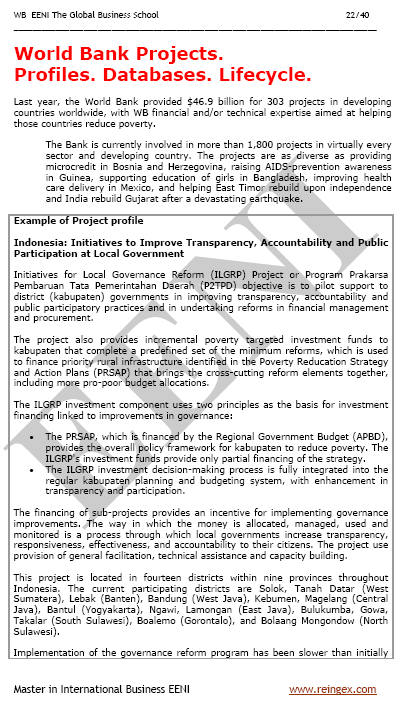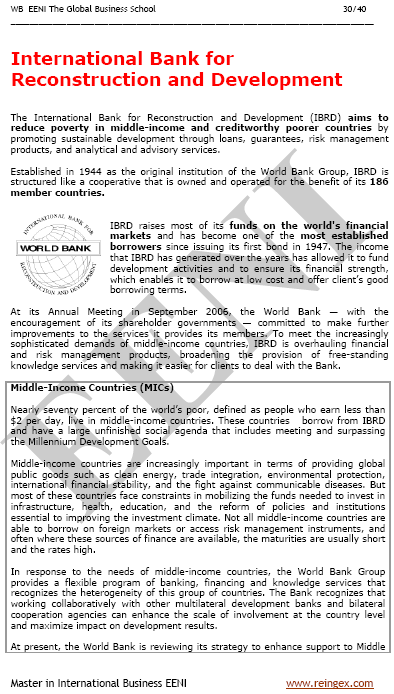World Bank. Trade Development

World Bank (WB). International Development Association. Projects
- Introduction to the WB
- World Bank Organization
- Member countries
- The World Bank and the Millennium Development Goals
- World Bank operations:
- Fund generation
- Loans
- Trust funds
- Grants
- Doing Business with the WB
- World Bank Projects;
- Profiles
- Databases
- Projects Lifecycle (Identification, preparation, appraisal, approval, implementation, completion, and evaluation)
- International Bank for Reconstruction and Development
- International Development Association
- World Development Indicators
The objectives of the subject “World Bank (WB)” are to
- Understand the purposes, structure, and functions of the World Bank
- Identify the areas of cooperation of the World Bank
- Analyze the loans of the World Bank
- Know the affiliated institutions: Multilateral Investment Guarantee Agency, International Bank for Reconstruction and Development, and the International Finance Corporation
- To understand the projects operation of the World Bank

The Subject “World Bank” belongs to the following Online Programs taught by EENI Global Business School:
Masters: International Business, Foreign Trade.
Languages:  or
or  Banque Mondiale
Banque Mondiale  Banco Mundial.
Banco Mundial.
Area of Knowledge: Globalization.

World Bank
The World Bank (WB) was created in 1994, as a specialized agency of the United Nations (UN), and consists of 184 member countries. The member economies of the World Bank define how the bank is financed and how its resources are used.
One of the objectives of the World Bank is to cooperate to reach the Millennium Development Goals (United Nations) and intended for a sustainable poverty reduction.
The “World Bank Group” consists of the International Bank for Reconstruction and Development and the International Development Association and three other Organizations; they supply low-interest loans, interest-free credit and grants to the developing countries.
World Bank:

- The International Finance Corporation promotes the private sector Investment by supporting the high-risk sectors or/and markets
- The Multilateral Investment Guarantee Agency provides a political risk insurance (guarantees) to the investors in the developing countries
- The International Centre for Settlement of Investment Disputes settles the foreign direct investment disputes between the foreign investors and their host nation
Member States of the World Bank: Afghanistan, Albania, Algeria, Angola, Antigua and Barbuda, Argentina, Armenia, Austria, Azerbaijan, Bahamas, Bahrain, Bangladesh, Barbados, Belarus, Belgium, Belize, Benin, Bhutan, Bolivia, Bosnia and Herzegovina, Botswana, Brazil, Bulgaria, Burkina Faso, Burundi, Cambodia, Cameroon, Canada, Cape Verde, Central African Republic, Chad, Chile, People's Republic of China, Colombia, The Comoros, the DR Congo, the Republic of the Congo, Costa Rica, Ivory Coast, Croatia, The Czech Republic, Denmark, Djibouti, Dominica, Dominican Republic, Eastern Caribbean States, Ecuador, Egypt, El Salvador, Equatorial Guinea, Eritrea, Estonia, Ethiopia, the EU, Fiji, Finland, France, Gabon, The Gambia, Georgia, Germany, Ghana, Greece, Grenada, Guatemala, Guinea, Guinea-Bissau, Guyana, Haiti, Honduras, Hungary, Iceland, India, Indonesia, Iran, Iraq, Israel, Italy, Jamaica, Japan, Jordan, Kazakhstan, Kenya, Kiribati, Kosovo, Kuwait, Kyrgyz Republic, Laos, Latvia, Lebanon, Lesotho, Liberia, Libya, Lithuania, Luxembourg, Macedonia, Madagascar, Malawi, Malaysia, Maldives, Mali, Marshall Islands, Mauritania, Mauritius, Mexico, FS Micronesia, Moldova, Mongolia, Montenegro, Morocco, Mozambique, Myanmar, Namibia, Nepal, Netherlands, Nicaragua, Niger, Nigeria, Norway, Oman, Pakistan, Palau, Panama, Papua New Guinea, Paraguay, Peru, The Philippines, Poland, Portugal, Qatar, Romania, Russia, Rwanda, Samoa, São Tomé, Senegal, Serbia, the Seychelles, Sierra Leone, Singapore, Slovakia, Slovenia, Solomon Islands, Somalia, South Africa, South Korea, Spain, Sri Lanka, Saint Kitts and Nevis, Saint Lucia, Saint Vincent and the Grenadines, Sudan, Suriname, Eswatini, Sweden, Switzerland, Syria, Tajikistan, Tanzania, Thailand, East Timor, Togo, Tonga, Trinidad and Tobago, Tunisia, Turkey, Turkmenistan, Uganda, Ukraine, UAE, the U.S., Uruguay, Uzbekistan, Vanuatu, Venezuela, Vietnam, West Bank and Gaza, Yemen, Zambia, Zimbabwe.
International Bank for Reconstruction and Development



